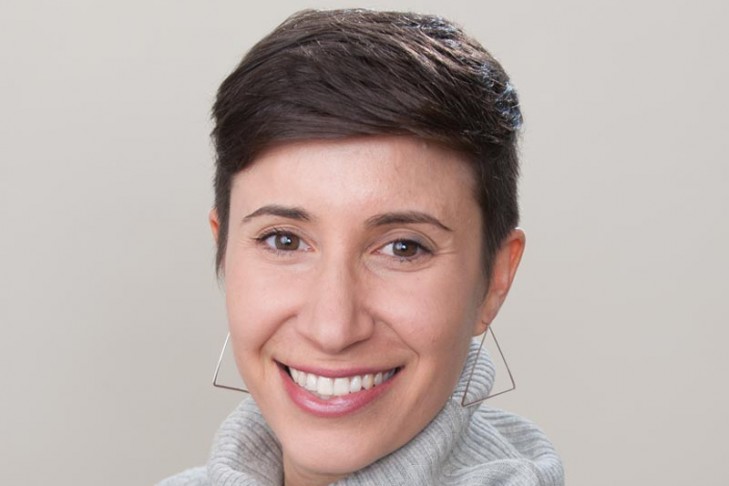Jordan Namerow confesses that she was one of those rare kids who enjoyed Hebrew school. Namerow, who grew up in northern New Jersey, has parlayed her early affinity for Jewish education into a thriving career as a Jewish professional. Over the years, she has developed an impressive resume that has most recently earned her a Schusterman Fellowship, where she is honing her leadership skills.
Based in Boston as the director of digital communications for American Jewish World Service (AJWS), Namerow brings a wealth of experience and passion to her position. But it’s those early synagogue experiences, coupled with growing up in a nourishing Jewish home, that Namerow credits with launching her as a Jewish professional.
In a recent interview with JewishBoston, she recalled that her Jewish identity was shaped by the time she spent at her synagogue and as a student at Prozdor, based at the Jewish Theological Seminary. “It was an interesting, fulfilling time in my Jewish education,” she said. “It had me thinking about how my Jewish values could be authentically integrated with my learning, my activism and my commitment to social justice.”
Those values were very much on Namerow’s mind when she entered Wellesley College just three days before 9/11 and at the height of the Second Intifada. She recalled that the confluence of those two events created a difficult atmosphere in which to be a progressive Jew in “a politically charged campus. There I was at Wellesley, encountering the conflicting realities of my peers—peers who were Pakistani, Nigerian, Iraqi, Lebanese, African-American, Muslim-American, Jewish, Christian and Hindu. Their worlds and worldviews were different from my own, and their understandings of Judaism were often contrary to how I defined my identity as a Jew.”
Nevertheless, Namerow felt just as Jewish at a “Save Darfur” rally or an LGBT gathering as she did leading Shabbat services at Wellesley’s Hillel. Wellesley was also a time of discovery for her. She came out as a lesbian in college and found that her Jewish and queer identities were very much integrated. Namerow recalled that at the time, a number of women at Wellesley’s Hillel were queer. “Another queer woman and I were co-presidents of Hillel,” she said. “I’m not sure how many Hillels in this country have ever had two openly lesbian co-presidents, or even one! I’ve always related to my Wellesley experience as a laboratory for grappling with pluralism, diversity, inclusion and difference.”
After college Namerow continued in Jewish professional roles with the Joint Distribution Committee (JDC) and the Jewish Women’s Archive (JWA). During her JDC fellowship she was in Warsaw, where she did intergenerational work between Jewish young adults who had recently discovered they were Jewish and Holocaust survivors. The work challenged her as she navigated several cultural and emotional gaps. “Here I was,” said Namerow, “an American Jew coming from a place of joy and strength trying to work with people who were traumatized, oppressed and marginalized. There was a huge gap between my experience and theirs.”
A year later she joined JWA as an online communications specialist. The work was a homecoming of sorts for Namerow, who once again pursued her deep interest in the history of Jewish women. At JWA she came across stories of Jewish women she had never heard of—women who nevertheless she saw as “shaping the contours of public Jewish life.” She also oversaw a blog, one of the first among Jewish organizations, called “Jewesses With Attitude.”
Namerow has been in her current job at AJWS for eight years. She came to AJWS as a volunteer in Uganda, where she worked with an organization, funded by AJWS, to combat stigma and discrimination against HIV-positive girls and women. It was her first time in Africa and many of her colleagues had never met a Jew. “I experienced my Jewish identity in a very different context,” she said. “My Jewishness was expressed through elevating the rights and dignity of oppressed women.”
Given Namerow’s experience and passion, it’s not a leap to understand why she was awarded the Schusterman Fellowship. Everything she’s worked toward has brought her to this moment. In a cohort of 30 people, the 18-month fellowship brings her into contact with a diverse group, many of whom Namerow describes as “having different lenses on the Jewish community.” While the vast majority of fellows are based in the United States, others come from Israel, Europe and Australia. Their work includes Jewish and civic engagement, education reform, social justice and LGBTQ issues.
As for the fellowship itself, like her peers Namerow has been matched with a professional coach, who most recently has helped her to “unpack” a 360-degree assessment where six to 10 people have offered their observations of her in a leadership role. In addition to the coaching, Namerow will also receive $15,000 for her own professional development and will implement a project to strengthen her work at AJWS.
Namerow noted that some of the highlights for her at a recent retreat with other fellows included sessions about grappling with leadership dilemmas and exploring the role of Judaism in cultivating a leadership presence. “This fellowship,” she said, “is an extraordinary opportunity that gives me time, space and resources to grow as a leader in a holistic, multi-dimensional way. I love that the program supports me as a full, complex person, as well as a Jewish professional.”
When she isn’t working at AJWS or participating in Schusterman Fellowship events, Namerow spends time with her wife, Idit Klein, and their son, Lior. She also hikes, runs and participates in local efforts that dovetail with her goal of “making the Jewish community more of an instrument for bringing social justice to the world.”
This post has been contributed by a third party. The opinions, facts and any media content are presented solely by the author, and JewishBoston assumes no responsibility for them. Want to add your voice to the conversation? Publish your own post here. MORE



